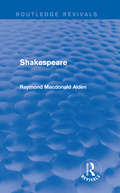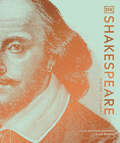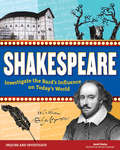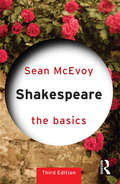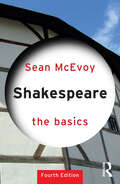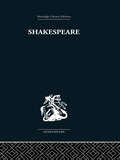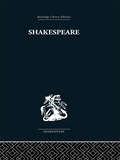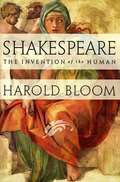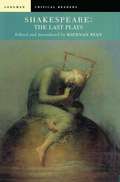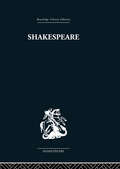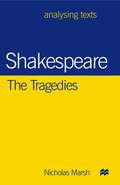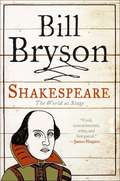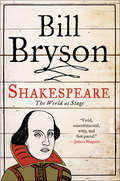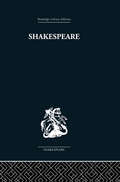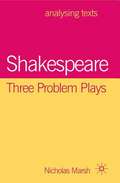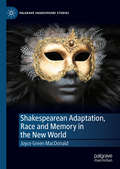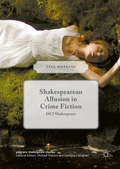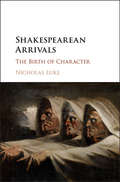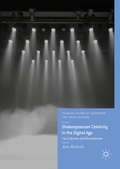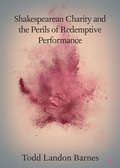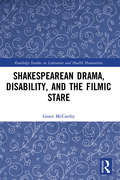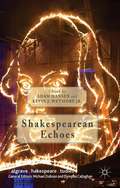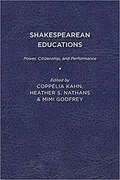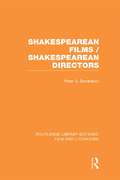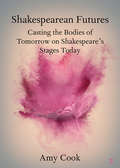- Table View
- List View
Shakespeare: From The Quarto Of 1609, With Variorum Readings And Commentary (Routledge Revivals)
by Raymond Macdonald AldenThis fascinating title, first published in 1922, presents a detailed overview of the life and works of Shakespeare. Alden first considers Shakespeare’s Elizabethan context, alongside exploring the Classical and Italian foundations, political theories, concepts and theatrical trends that influenced his works. Next, a comprehensive biography provides insight into Shakespeare’s probable education, relationships and contemporaries. The final sections are devoted to the genres into which Shakespeare’s works have been categorised, with full analyses of and backgrounds to the poems, histories, comedies and tragedies. An important study, this title will be of particular value to students in need of a comprehensive overview of Shakespeare’s life and works, as well as the more general inquisitive reader.
Shakespeare: His Life and Works (DK Ultimate Guides)
by Leslie Dunton-Downer Alan RidingA comprehensive collection of the life and works of a literary great — William Shakespeare!The beautifully illustrated guide unravels the life and works of Shakespeare and his plays, from language, history, and themes to plays, poems, and sonnets. Explore the art of this famous playwright and his enduring legacy through the stunning gift format.Celebrate one of the theaters most influential contributors through his legendary works of comedy, tragedy, romance, and poetry. Inside this playbook, you&’ll find: • A clear and accessible format. • Plot summaries of all 39 plays with lists of characters. • Guidance on how to read and interpret his great sonnets and narrative poems. • Plays ordered by time and genre, helping readers trace the development of Shakespeare&’s topics, themes, and artistry. • Sidebars that clarify the mythological, geographical and historical context of each play and decode its language, dramatic action, and themes. • Illuminated guidance on how to approach reading the play and seeing it perform.Shakespeare fans will revel in the marvelous depiction of the Stratford-upon-Avon born Bard himself! His drama book allows you to dive into famous works like Hamlet, Romeo and Juliet, and A Midsummer Night&’s Dream, and explore Shakespeare&’s sources and inspirations for each! Themes, plots, characters, and language are brought to life with act-by-act plot summaries, resumes of main characters, and in-depth analysis of Shakespeare&’s use of the English language. Shakespeare: His Life and Works is a wonderful exploration of plays, poems, and sonnets in the context of his life and the Elizabethan and Jacobean theatre, further enriching your on the page (or stage, or screen!) experience.
Shakespeare: Investigate the Bard's Influence on Today's World
by Samuel Carbaugh Andi Diehn"Romeo, Romeo, wherefore art thou Romeo?" Teenagers have been sighing an approximation of these words for centuries, ever since William Shakespeare had Juliet utter them from her balcony in one of the most popular plays of all time, Romeo and Juliet. Tales of love, loss, rebellion, rivalry-before there was Twilight, Warm Bodies, and The Lion King, there was Shakespeare. The characters, language, imagery, and plot elements of many books and movies that appear on bookshelves and in cinemas today are directly influenced by the plays of the Bard.In Shakespeare: Investigate the Bard's Influence on Today's World, readers discover links between the books, movies, and music they listen to today and the words that were written and acted out more than 400 years ago. Readers deconstruct Shakespearean themes, imagery, language, and meaning by finding familiar ground on which to gain literary insight. Through hands-on projects such as coding a video game based on one of Shakespeare's plays to rewriting a scene in the text language of emoji, readers find compelling avenues into the dramatic, sometimes intimidating language, leaving them well-equipped to tackle any major text in the academic years to come.
Shakespeare: The Basics (The Basics)
by Sean McEvoyNow in its third edition Shakespeare: The Basics is an insightful and informative introduction to the work of William Shakespeare. Exploring all aspects of Shakespeare’s plays including the language, cultural contexts, and modern interpretations, this text looks at how a range of plays from across the genres have been understood. Updates in this edition include: Ecocritical, queer, presentist and gendered discussions of Shakespeare’s work Studies of new performances including Tennant and Tate’s Much Ado About Nothing Critical discussions of race and politics in Othello and King Lear Case studies of modern film versions of Shakespeare’s works A chronology of Shakespeare’s work and contemporary events With fully updated further reading throughout and a wide range of case studies and examples, this text is essential reading for all those studying Shakespeare’s work.
Shakespeare: The Basics (The Basics)
by Sean McEvoyShakespeare: The Basics is a lively and accessible introduction to reading and studying Shakespeare. Exploring all aspects of Shakespeare’s plays, Sean McEvoy considers the language, cultural contexts and modern interpretations.This essential guide to a range of contemporary Shakespearean criticism explores and unpacks the different dramatic genres in which he wrote – comedy, history, tragedy and romance. It also provides a wealth of relevant and concise information on the historical, social and political contexts in which the plays were produced and have been understood. Extensively updated throughout, the fourth edition provides: A comprehensive account of Shakespearean tragedy for students An introduction to ecocritical, ethical and queer readings of the plays Analysis of notable recent Shakespeare films and productions Enhanced contextual material on race and empire, gender roles and the theatre in politics With fully updated further reading throughout and a wide range of case studies and examples, Shakespeare: The Basics is an indispensable introduction for college and university students of literature and theatre, but also for anyone with an interest in the world’s most influential dramatist.
Shakespeare: The Cambridge Dover Wilson Shakespeare (cambridge Library Collection. Literary Studies) (Cambridge Dover Wilson Shakespeare Ser. #Vol. 17)
by George Ian DuthieFirst published in 1951. 'The book has the sterling qualities of shrewd sense and acumen that mark the 'rational' classical school of Shakespeare criticism.' Notes and Queries 'Professor Duthie's approach is direct and extremely objective. With no axe to grind, he pays impartial court to most of the great schools of Shakespearian criticism.' Cambridge Daily News 'Professor Duthie has much to say that is wise and judicious'. Times Literary Supplement. Contents include: Shakespeare's Characters and Truth to Life; Shakespeare and the Order-Disorder Antithesis; Comedy; Imaginative Interpretation and Troilus and Cressida; History; Tragedy; The Last Plays.
Shakespeare: The Dark Comedies to the Last Plays: from satire to celebration (Shakespeare Survey Ser. #44)
by R A FoakesFirst published in 1971. This volume explains and analyses the last plays of Shakespeare as dramatic structures. Beginning from the dark comedies, the author describes the ways in which Shakespeare was affected by the new techniques and possibilities for drama opened up by the innovations of the years after 1600, notably by the rise in children's companies. The main line of development of Shakespeare's dramatic skills is shown as leading from the dark comedies, through the late tragedies, to the last plays. A major part of the book is devoted to analyses of Cymbeline, The Winter's Tale, The Tempest and King Henry VIII.
Shakespeare: The Invention of the Human
by Harold Bloom"Shakespeare: The Invention of the Human is an analysis of the central work of the Western canon, and of the playwright who not only invented the English language, but also, as Bloom argues, created human nature as we know it today. Before Shakespeare there was characterization; after Shakespeare, there were characters, men and women capable of change, with highly individual personalities." "Shakespeare: The Invention of the Human is a companion to Shakespeare's work, and just as much an inquiry into what it means to be human. It explains why Shakespeare has remained our most popular and universal dramatist for more than four centuries, and in helping us to better understand ourselves through Shakespeare, it restores the role of the literary critic to one of central importance in our culture."--BOOK JACKET.Title Summary field provided by Blackwell North America, Inc. All Rights Reserved
Shakespeare: The Last Plays (Longman Critical Readers)
by Kiernan RyanThis is the first collection of criticism on Shakespeare's romances to register the impact of modern literary theory on interpretations of these plays. Kiernan Ryan brings together the most important recent essays on Pericles, Cymbeline, The Winter's Tale and The Tempest, the greatest of the `last plays', staging a dynamic debate between feminist, poststructuralist, psychoanalytic and new historicist views of the masterpieces Shakespeare wrote at the close of his career.The book aims not only to anthologise accounts of the last plays by leading Shakespearean critics, including Stephen Greenblatt, Janet Adelman, Leah Marcus, Howard Felperin and Steven Mullaney, but also to dramatise what is at stake in the choice of a particular critical approach. It allows the student to compare the strengths and limitations of a deconstructive and a feminist reading of the same romance, or to test the plausibility of one psychoanalytic angle on the last plays against another. The headnotes that preface the essays highlight their distinctive slants on Shakespearean romance, unpack the theoretical assumptions that steer their interpretations, and throw into relief the key points at which their authors collide or converge.The editor's introduction places the essays in the context of twentieth-century criticism of the last plays and makes a powerful case for a fundamental reappraisal of Shakespearean romance. The comprehensive, fully annotated bibliography provides an unrivalled guide to further reading on all four plays.
Shakespeare: The Poet in his World
by M. C. BradbrookFirst published in 1978. In this study, Shakespeare's own life story and the development of English theatrical history are placed in the wider context of Elizabethan and Jacobean times, but the works themselves are the final objective of this 'applied biography'. The main contention of the book is that Shakespeare's life was the lure of the stage itself which inspired him to transform what everyday life provided into the worlds of Hamlet, King Lear and Prospero.
Shakespeare: The Tragedies (Analysing Texts)
by Nicholas MarshThought of as Shakespeare's most powerful works, the four great tragedies, Hamlet, King Lear, Othello and Macbeth, are texts of unparalleled richness and depth, stimulating and exciting to study. This book takes extracts and examines them, explaining how the critic can use particular techniques to bring out complexities of meaning, understand the patterns of metaphor and the rhythms of the poetry and appreciate the ever-living drama. Chapters on the openings and endings of plays, heroes and heroines, society, humour, imagery and the tragic universe guide the student on a journey of inquiry into the nature of Shakespeare's tragic vision. Far from simplifying Shakespeare, the reader is challenged to confront the depth and subtlety of the dramas, and to enjoy the analytical pursuit of ever finer insight, ever fuller understanding.
Shakespeare: The World as Stage
by Bill BrysonAmerican native Bryson, alive and well in England, sets out what little is known about the life of the Elizabethan playwright and samples the voluminous scholarship about his work and its influence on English as a language and a body of literature. His approach is lighthearted and non-technical. Annotation ©2008 Book News, Inc., Portland, OR (booknews.com)
Shakespeare: The World as Stage
by Bill BrysonBill Bryson's bestselling biography of William Shakespeare takes the reader on an enthralling tour through Elizabethan England and the eccentricities of Shakespearean scholarship--updated with a new introduction by the author to commemorate the 400th anniversary of Shakespeare's deathWilliam Shakespeare, the most celebrated poet in the English language, left behind nearly a million words of text, but his biography has long been a thicket of wild supposition arranged around scant facts. With a steady hand and his trademark wit, Bill Bryson sorts through this colorful muddle to reveal the man himself. His Shakespeare is like no one else's--the beneficiary of Bryson's genial nature, his engaging skepticism, and a gift for storytelling unrivaled in our time.
Shakespeare: The art of the dramatist (Princeton Legacy Library #1782)
by Roland Mushat FryeThis edition first published in 1982. Previous edition published in 1972 by Houghton Mifflin. Outlining methods and techniques for reading Shakespeare's plays, Roland Frye explores and develops a comprehensive understanding of Shakespeare's drama, focussing on the topics which must be kept in mind: the formative influence of the particular genre chosen for telling a story, the way in which the story is narrated and dramatized, the styles used to convey action, character and mood, and the manner in which Shakespeare has constructed his living characterizations. As well as covering textual analysis, the book looks at Shakespeare's life and career, his theatres and the actors for whom he wrote and the process of printing and preserving Shakespeare's plays. Chapters cover: King Lear in the Renaissance; Providence; Kind; Fortune; Anarchy and Order; Reason and Will; Show and Substance; Redemption and Shakespeare's Poetics.
Shakespeare: Three Problem Plays (Analysing Texts Ser.)
by Nicholas MarshWritten in 1602-4, between Hamlet and the other great tragedies, Shakespeare's three Problem Plays are so called because they do not fit easily into the other groups of plays. They are awkward dramas, full of unresolved controversies, which leave audiences and readers unsettled by contradictory responses. Nicholas Marsh uses close analysis of extracts from the plays to explore how Shakespeare maintains competing discourses within a single text. In the first part of his study, Marsh highlights the multiple interpretations these plays provoke and provides useful sections on methods of analysis to encourage readers to develop their views independently. The second part of the book discusses the Problem Plays in relation to the playwright's other works, and examines their cultural and historical contexts. A comparison of five modern critical views and helpful suggestions for further reading provide a bridge to continuing study. In this essential guide to a complex set of plays, Marsh does not seek to reconcile the thorny issues these dramas leave open: rather, he equips the reader with the necessary critical tools to fashion their own synthesis.
Shakespearean Adaptation, Race and Memory in the New World (Palgrave Shakespeare Studies)
by Joyce Green MacDonaldAs readers head into the second fifty years of the modern critical study of blackness and black characters in Renaissance drama, it has become a critical commonplace to note black female characters’ almost complete absence from Shakespeare’s plays. Despite this physical absence, however, they still play central symbolic roles in articulating definitions of love, beauty, chastity, femininity, and civic and social standing, invoked as the opposite and foil of women who are “fair”. Beginning from this recognition of black women’s simultaneous physical absence and imaginative presence, this book argues that modern Shakespearean adaptation is a primary means for materializing black women’s often elusive presence in the plays, serving as a vital staging place for historical and political inquiry into racial formation in Shakespeare’s world, and our own. Ranging geographically across North America and the Caribbean, and including film and fiction as well as drama as it discusses remade versions of Othello, Romeo and Juliet, Antony and Cleopatra, and The Taming of the Shrew, Shakespearean Adaptation, Race, and Memory in the New World will attract scholars of early modern race studies, gender and performance, and women in Renaissance drama.
Shakespearean Allusion in Crime Fiction
by Lisa HopkinsThis book explores why crime fiction so often alludes to Shakespeare. It ranges widely over a variety of authors including classic golden age crime writers such as the four 'queens of crime' (Allingham, Christie, Marsh, Sayers), Nicholas Blake and Edmund Crispin, as well as more recent authors such as Reginald Hill, Kate Atkinson and Val McDermid. It also looks at the fondness for Shakespearean allusion in a number of television crime series, most notably Midsomer Murders, Inspector Morse and Lewis, and considers the special sub-genre of detective stories in which a lost Shakespeare play is found. It shows how Shakespeare facilitates discussions about what constitutes justice, what authorises the detective to track down the villain, who owns the countryside, national and social identities, and the question of how we measure cultural value.
Shakespearean Arrivals: The Birth of Character
by Nicholas LukeIn this distinctive study, Nicholas Luke explores the abiding power of Shakespeare's tragedies by suggesting an innovative new model of his character creation. Rather than treating characters as presupposed beings, Luke shows how they arrive as something more than functional dramatis personae - how they come to life as 'subjects' - through Shakespeare's orchestration of transformational dramatic events. Moving beyond dominant critical modes, Luke combines compelling close readings of Romeo and Juliet, Othello, Hamlet, Macbeth, and King Lear with an accessible analysis of thinkers such as Badiou, Zizek, Bergson, Whitehead and Latour, and the 'adventist' Christian tradition flowing from Saint Paul through Luther to Kierkegard. Representing a significant intervention into the way we encounter Shakespeare's tragic figures, the book argues for a subjectivity which is not singular or abiding, but perilous and leaping.
Shakespearean Celebrity in the Digital Age: Fan Cultures and Remediation (Palgrave Studies in Adaptation and Visual Culture)
by Anna BlackwellThis book offers a timely examination of the relationship between Shakespeare and contemporary digital media. By focusing upon a variety of ‘Shakespearean’ individuals, groups and communities and their ‘online’ presence, the book explores the role of popular internet culture in the ongoing adaptation of Shakespeare’s plays and his general cultural standing. The description of certain performers as ‘Shakespearean’ is a ubiquitous but often throwaway assessment. However, a study of ‘Shakespearean’ actors within a broader cultural context reveals much, not only about the mutable face of British culture (popular and ‘highbrow’) but also about national identity and commerce. These performers share an online space with the other major focus of the book: the fans and digital content creators whose engagement with the Shakespearean marks them out as more than just audiences and consumers; they become producers and critics. Ultimately, Digital Shakespeareans moves beyond the theatrical history focus of related works to consider the role of digital culture and technology in shaping Shakespeare’s contemporary adaptive legacy and the means by which we engage with it.
Shakespearean Charity and the Perils of Redemptive Performance (Elements in Shakespeare Performance)
by Todd Landon BarnesThis Element examines recent documentaries depicting marginalized youth who are ostensibly redeemed by their encounters with Shakespeare. These films emerge in response to four historical and discursive developments: the rise of reality television and its emphasis on the emotional transformation of the private individual; the concomitant rise of neoliberalism and emotional capitalism, which employ therapeutic discourses to individualize social inequality; the privatization of public education and the rise of so-called “no-excuses” or “new paternalist” charter schools; and the emergence of new modes of address infusing evangelical conversion narratives with a therapeutic self-help ethos.
Shakespearean Drama, Disability, and the Filmic Stare (Routledge Studies in Literature and Health Humanities)
by Grace McCarthyShakespearean Drama, Disability, and the Filmic Stare synthesizes Laura Mulvey’s male gaze and Rosemarie Garland-Thomson’s stare into a new critical lens, the filmic stare, in order to understand and analyze the visual construction of disability in adaptations of Shakespearean drama. The book explores the intersections of adaptation studies, film studies, Shakespeare studies, and disability studies to analyze twentieth and twenty-first century representations of both physical disability and ‘madness’ in global cinematic film, television film, and digital broadcast cinema in Shakespeare’s works. Shakespearean Drama, Disability, and the Filmic Stare argues that the filmic stare does not differentiate between male and female characters with disabilities, or between powerful and powerless figures in disability representation. This multi-disciplinary volume is ideal for disability studies scholars, Shakespeare scholars, and those interested in adaptations of Shakespeare’s famous works.
Shakespearean Echoes
by Jr Adam Hansen Kevin J. WetmoreShakespearean Echoes assembles a global cast of established and emerging scholars to explore new connections between Shakespeare and contemporary culture, reflecting the complexities and conflicts of Shakespeare's current international afterlife. Shakespearean echoes appear in diverse genres and cultural forms, from pop music of the seventies through the writing of Toni Morrison, to the book and film of Let the Right One In. Chapters deal with digital Shakespeare, Shakespeare on the web, and the powerful echoes of Shakespeare to be found in such seemingly unrelated texts as the television program Lost, sports broadcasts, and Game of Thrones. Within those discussions certain Shakespearean texts (such as Othello or Romeo and Juliet) recur; likewise certain modes of popular culture (such as science fiction) reappear. The collection helps readers navigate the diversity of Shakespeare's legacy.
Shakespearean Educations: Power, Citizenship, and Performance
by Elizabeth Renker Sandra M. Gustafson Theodore Leinwand Denise Albanese Coppélia Kahn Jonathan Burton Dayton Haskin Heather S. Nathans Jennifer Mylander Nan Johnson Marvin McAllister Rosemary KeglShakespearean Educations examines how and why Shakespeare’s works shaped the development of American education from the colonial period through the 1934 Chicago World’s Fair, taking the reader up to the years before the Servicemen’s Readjustment Act of 1944 (popularly known as the GI Bill), coeducation, and a nascent civil rights movement would alter the educational landscape yet again. The essays in this collection query the nature of education, the nature of citizenship in a democracy, and the roles of literature, elocution, theater, and performance in both. Expanding the notion of “education” beyond the classroom to literary clubs, private salons, public lectures, libraries, primers, and theatrical performance, this collection challenges scholars to consider how different groups in our society have adopted Shakespeare as part of a specifically “American” education. Shakespearean Educations maps the ways in which former slaves, Puritan ministers, university leaders, and working class theatergoers used Shakespeare not only to educate themselves about literature and culture, but also to educate others about their own experience. Published by University of Delaware Press. Distributed worldwide by Rutgers University Press.
Shakespearean Films/Shakespearean Directors (Routledge Library Editions: Film and Literature)
by Peter S. DonaldsonOriginally published in 1990, this book brought a new rigor and subtlety to the interpretation of film adaptations of Shakespeare. Drawing on traditional literary analysis, psychoanalysis, and current film theory about gender and subjectivity, the author combines close readings of seven films with historical and biographical studies of the directors who made them. Offering substantial readings of Jean-Luc Godard’s controversial deconstructed King Lear and of Liz White’s independent African-American Othello, Donaldson also applies his provocative and contemporary point of view to more familiar films. He reads Olivier’s Henry V in relation to its treatment of sexual difference; Olivier’s Hamlet in part as an expression of the director’s childhood sexual trauma; Kurosawa’s Throne of Blood as an allegory of the relationship between Western and Japanese cinema; and Zeffirelli’s immensely popular Romeo and Juliet in the light of its powerful homoerotic subtext. With striking perspectives on Shakespeare, on the movies as an expressive medium, and on the complex processes of cultural change, this is timeless useful reading for teachers and students of film and literature.
Shakespearean Futures: Casting the Bodies of Tomorrow on Shakespeare's Stages Today (Elements in Shakespeare Performance)
by Amy CookCasting is the process by which directors assign parts to actors, creating the idea of the character for the audience. Casting is how we rehearse change, as we come to see an expanded repertoire of the kinds of bodies that are selected to play the lead, the hero, and the villain. This Element focuses on the casting in productions of Shakespeare from 2017–2020 to demonstrate how casting functions affectively and cognitively to reimagine who can be what. The central argument is that directors are using casting as the central mode of meaning-making in productions of Shakespeare.
